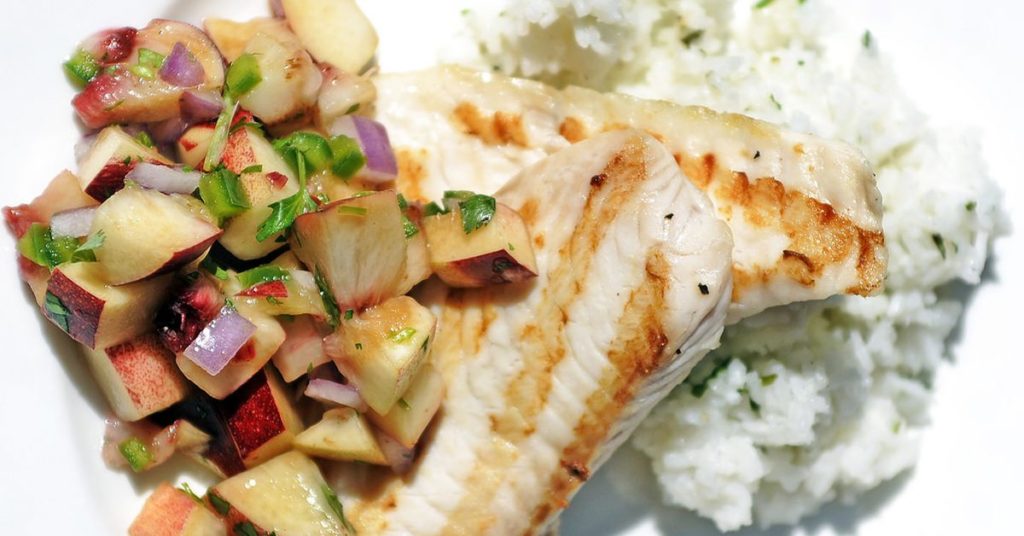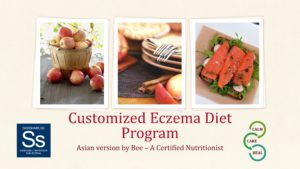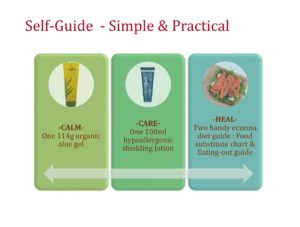- Overview
- Food & Our Skin
- Perception of Diet as a Treatment
- The Alkaline Eczema Diet
- Photos – Before & After
- List of Food to Avoid & Include
Overview
Eczema diet is very simply – food choices that are scientifically and nutritionally proven to prevent and minimize itch and inflammation of the skin.
If you are reading this article, you or probably your loved one is suffering from eczema and you are willing to try anything to relief the symptoms.
You must first believe that the everyday food that we consume and eat will somewhat contribute to conditions that aggravate eczema. And instead of loading and aggravating our skin, we switch to a diet that does not contribute to any of the itching and inflammation.
Choosing the correct food will also promote healing and nourishment to the skin to repair faster.
In order to convince yourself to read on further, here is a simple photo of how an eczema diet can improve rash, itchiness and inflammation:
Food & Our Skin
How does food affect our body?
All of us inherits genes from our parents and your genetic makeup (which is called DNA) is your blueprint. Did you know that what you eat and drink influences how the blueprint is read and implemented.
Health issues (eg. allergy) happens when total environmental load ie. what you eat, breath, think and do exceeds your particular genetic to adapt.
For some people, it becomes a more serious health condition when they are diagnosed with diabetes or heart disease. But for some, it slowly surfaces through the skin by showing symptoms of rash, itching and hives.
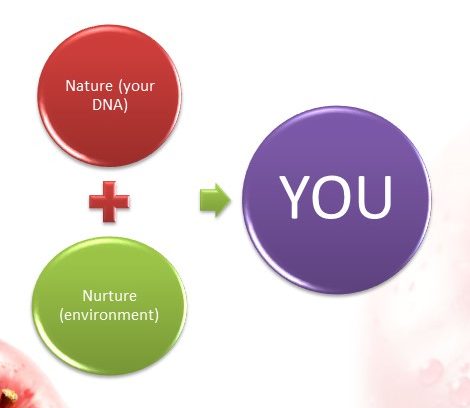
Is Your Eczema Purely Caused by Food?
The exact cause of atopic eczema is unknown, but it’s clear it is not down to one single thing. Atopic eczema often occurs in people who get allergies – “atopic” means sensitivity to allergens.
The symptoms of atopic eczema often have certain triggers, such as soaps, detergents, stress and the weather. Sometimes food allergy or intolerance can play a part, especially in young children with severe eczema.
There are several tests to identify food allergy : skin prick test and blood IgE test. These tests can be conducted in most public hospitals and some dermatologists clinics.
A skin prick test is a physical test whereby common food substance is embedded into the skin via a blunt needle for a short period of time and then the results are read and observed almost immediately within the next hour. Blood tests measure the presence of IgE antibodies reading/reaction to specific foods (IgE is short for “immunoglobulin E,” is the antibody that triggers food allergy symptoms).
These blood tests are a gauge but they are not 100% accurate and an allergist/dermatologist can only confirm an allergy by asking the patient to log a food diary or trial diet elimination.
Certain foods CAN cause itching
Did you know that even if you are not diagnosed via the tests above to be allergic to a food substance, there are many foods that we eat today that can and may be the cause of your itching.
Some food are obviously bad for the skin due to the toxin but the unknown fact is that some seemingly healthy whole food which are harmless to normal healthy person, may be aggravating your itch.
This is due to the natural chemical compound in the plant food ie. salicylate and amines which may trigger our body to produce histamines which causes skin itching. Some of these common vegetables are broccoli and tomato, and even fruits like grapes!
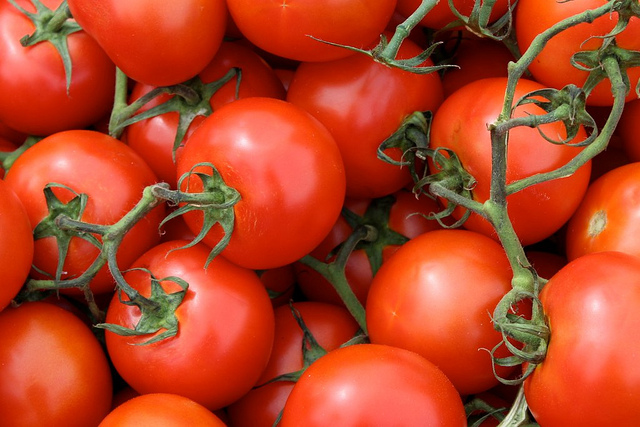
And some foods can cause skin inflammation
In our busy city lifestyle, we tend to reach out to processed food for convenience and time saving. Most of the food we consume have lost their nutrient and instead, may artificial flavoring and preservatives have been added to enhance the taste.
These unnatural food are anti-nutrients and causes toxin load to our liver, which in excess may reflect in our skin appearance.
Switching your diet can be difficult
While now we are aware that there are some food that can aggravate the skin, fresh and whole food is nutritious to our body and essential for us to survive. In fact, most fresh food is nature’s medicine.
In that case, why is there a reluctance to switch our diet?
Here are some of the reasons that people have for not switching their diets to try and manage their eczema:
Too much trouble and not practical
Starting on an alkaline based eczema diet is not extremely restrictive like a juicing diet fad. It is not entirely restrictive, there are many readily available food substitutes that can be selected to replace the offending food. In fact, the stricter phase is only a short duration of a few weeks and slowly food can be re-introduced once the skin has cleared up.
Too long to wait before seeing any real improvement
Many eczema & dermatitis sufferers find that they have tried many other faster remedies but it still does not cure them completely, but only masks the symptoms and they feel other side effects of just relying on medication without complimenting holistic natural remedies. In the long run, they end up trying many short term remedies which in the end totals to a longer time.
Too expensive
Constantly paying for specialist consultation and TCM treatments are also costly. Buying special cleansers, moisturizer, lotion, antiseptic wash, special clothings are demanding on the pocket. While all these are still required to ensure you have the correct professional advice and good quality skincare, embarking an eczema-friendly diet will complement these therapies and reduce the need for expensive treatments.
Thus, in order to ensure that we reap the effective benefit of a suitable diet, it needs to be scientific based, aim to minimize eczema symptoms and skin healing food.
The Alkaline Eczema Diet
What is an eczema diet?
In simple terms, it is eating whole natural food that does not cause itchiness or inflammation of the skin.
For you, it means substituting some of your current food choices with eczema-friendly food, certain food elimination until your rash clears or stabilizes.
As required, an eczema diet can be supplemented with essential supplements that can help the skin nourish and heal faster.
How will an eczema diet help eczema and dermatitis sufferers?
The fundamental of eczema diet is that it is alkaline based, and to eliminate food that causes skin inflammation and itchiness. It is as simple as that!
This eczema diet is recommended by an Australian nutritionist, Karen Fischer who has dedicated over 10 years of her specialization in eczema related diet and nutrition.
At Skinshare.sg, we have adapted this eczema diet guideline to suit the Singaporean and Malaysian diet. Our certified nutrition therapist herself has gone through the diet and noticed significant healing.
In our daily diet, 80% of our food that we consume are acidic in nature, thus the need to consciously ensure that we include alkaline food in our diet. If our body becomes too acidic, it can cause inflammation and this is one of the key symptom that eczema sufferers will need to reduce to manage flareups.
Before and after results of following an eczema diet
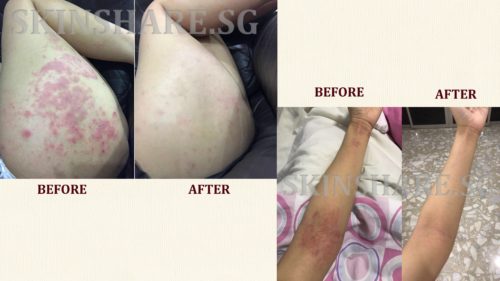
List of Foods for Eczema Diet
What are the food to avoid?
So what are the list of food that can aggravate the skin and to be avoided? Here is the list:
| Type of Food | Why should we avoid? |
|---|---|
| Dairy products | Generally dairy product are not good for the gastrointestinal tract as it can cause leaky gut syndrome. Base on several medical advice, if you have any infection, it is a food for bacteria to feed on and it will aggravate the rashes symptoms. This also includes any by-products made from cow's milk eg. cheese cake, yogurt, cheese |
| Certain fruits example : Kiwi | Some of these fruits are strongly acidic. Since they are very high in Vitamin C, you can substitute for safer fruit eg. guava, papaya which are also high in Vit. C content. On the contrary, lemon/lime is good for you - even though highly acidic, once consumed with a pinch of salt, it is a very good alkalizing drink which is good for the body's acid-alkaline balance. |
| Certain vegetables example : tomato | Tomato contains the 3 natural sources of chemical which triggers itchiness. Do be mindful to also avoid by product eg. tomato sauce, bolognese sauce |
| Dried fruits (which contains sulfite as preservative) | The preservatives used in dried fruits are itch causing. You can opt for freeze dried/baked or organic version. |
| CRAP (Carbonated Drinks, Refined Food, Artificial Flavoring/Colouring, Processed Food) | Carbonated drinks, artificial flavouring and colouring are processed food, some chemically derived and has no nutrient. Refined food like sugar and white flour has been heavily processed and the nutrients of the natural food source remains very little. |
| Any food that you are allergic to | If you notice that you get an allergy reaction if you eat a specific food, then you have to totally avoid them. |
What foods to eat to relive eczema?
Vegetables
Leeks, celery, cauliflower, lettuce, cucumber, sweet potato are some of the vegetables that are alkaline and eczema-friendly.
Fruits
Papaya is the ultimate skin food. It is rich in vitamin C and the lycopene content helps from sun damage. Banana is another eczema-friendly fruit that is easily found in markets and supermarkets here in Asia and very affordable. Pear and watermelon are also high in water content and are not itch-causing.
Protein
Protein is essential in our diet for skin and collagen forming. However, we will need to eat good quality protein and in meat in moderation. Beans, legumes and lentils are the best form of protein. However, you can also consume fresh fish which are easily found in market and supermarket here. Lean chicken meat in small quantity can also be included. Pork broth and beef broth (skimming off the saturated fat) is also good for skin healing.
Carbohydrates/Grains
In the beginning of the eczema diet(at least for 4-8 weeks), it is advisable to eliminate wheat in the diet. Slowly, whole wheat can be slowly re-introduced. Sweet potato, potato, quinoa, brown rice are some of the good eczema-friendly carbohydrate sources.
There are more options of food that we can include when we are on eczema-diet. A customized diet plan should be done by a nutrition therapist, with guidance to achieve the optimal results.
How long should you be on the eczema diet before you can notice results?
Typically, within 4-8 weeks of following the eczema diet strictly, you will should be able to start noticing some improvements in your skin health/condition.
When your rash is totally cleared or no longer inflamed/itchy, you can start to slowly re-introduce some of the food to test if they are indeed triggers for you.
Most people find it difficult to go on a strict diet with their busy daily schedule. We have an experienced certified nutritionist that can help you to slowly adapt and customize the plan for you if you are interested to embark on this journey.
Sustainability is important to see results and thus, you cannot change your diet overnight. It requires some preparation and guidance e.g. what you can choose to eat when you are in a hawker centre, or eating out.
Do also bear in mind that eczema diet can be concurrently implemented with your medical treatment and skincare regime. You should continue to follow a proper eczema skincare regime, combined with an eczema diet as part of a holistic approach to a long term healing process.
Get a diet plan for your eczema
In our Asian-adapted eczema diet nutrition consultation package, we will provide a food chart, some recommended supplements (depending on your condition) and practical program guide customized to your condition and pace.
If you prefer a customized diet plan, we also offer consultation by a certified nutrition therapist.
We are seeing more and more eczema skin condition on the rise in Singapore, and worldwide. 1 in every 5 person suffers from this skin condition and it is very common in today’s modern city life. It is a chronic condition, with no immediate medical cure but we hope and believe that with the correct natural eczema diet approach, you will be able to lead your life as normal as possible, in the comfort of your skin.


